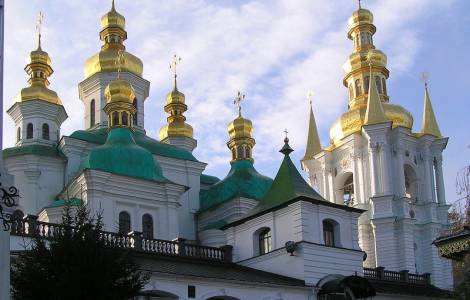
Wikipedia
by Chiara Dommarco
Moscow (Fides News Agency) - Following the approval by Kiev's Verkhovna Rada of Bill 8371 "On the protection of the constitutional order within the purview of the activities of religious organizations", the Orthodox Church of the Moscow Patriarchate expressed itself against the Ukrainian legislative text by way of two official documents.
The law - passed on August 20th at second reading at the unicameral Parliament of Ukraine - prohibits the existence on Ukrainian territory of the Ukrainian Orthodox Church (UOC MP – Ukrainian Orthodox Church of the Moscow Patriarchate, hereinafter UOC), formally linked to the Moscow Patriarchate, and all international organizations affiliated to it (see Fides 21/8/2024). President Volodymyr Zelens'kyj, who repeatedly expressed his support for Bill 8371, signed the law on August 24.
The first document issued by the Moscow Patriarchate was a statement by the Holy Synod, published on August 22, which reads: "Between 2014 and 2023, the Holy Synod of the Russian Church repeatedly perceived the pressure to which the Ukrainian Orthodox Church was subjected, pressure that presents clear traits of anti-religious state policy. (…) Despite the fact that many experts and human rights organizations in the West have recognized violations of the rights of Ukrainian Orthodox Church worshippers, this has not been an obstacle to the adoption of a bill that destroys the very idea of freedom of conscience and fundamental human rights. ”
Along the same lines was the letter of August 24 that the Patriarch of Moscow and All Russia Kirill addressed to several heads of Christian communities - including Pope Francis - and diplomats, such as the Secretary-General of the United Nations, António Guterres, the Secretary-General of the Organization for Security and Cooperation in Europe, Helga Maria Schmid, and the United Nations High Commissioner for Human Rights, Volker Türk. In one passage of the letter, the Patriarch said: "Blatant contradictions of the provisions in this law with the norms of the Ukrainian Constitution, with international agreements, with human rights and with the fundamental principles of law were repeatedly observed in the documents of the main human rights organizations. The Ukrainian authorities' anti-ecclesial policy has been criticized by the international community for many years. The Moscow Patriarchate has repeatedly witnessed the situation of Ukrainian believers and the persecution launched against them. "
At the end of the Angelus prayer on August 25, Pope Francis expressed himself clearly in favor of the protection of each particular Church, expressing concern after the approval of Bill 8371: "I continue to follow fighting in Ukraine and the Russian Federation with dismay – the Pontiff said -, and thinking of the norms of the recently adopted law in Ukraine, I fear for the freedom of those who pray, because those who truly pray always pray for everyone. One doesn't do evil because one prays. If someone does evil against their people, they will be guilty of it, but they cannot have done such evil because they prayed. So let those who want to pray in what they consider to be their Church, pray. Please do not abolish any Christian Churches directly or indirectly. Don't touch the Churches!".
Already following the approval at first reading by the Verkhovna Rada of the law on the abolition of the UOC in Ukrainian territory - which took place on October 19, 2023 - High Commissioner Türk had expressed concern about the compatibility of the text of Bill 8371 with respecting fundamental human rights.
Over the past few days, a delegation of the Ecumenical Patriarchate of Constantinople is visiting Kiev, it comprises three representatives of Ukrainian origins: Metropolitan Ilarion (Ohijenko), Archbishop of Winnipeg and Primate of the Ukrainian Orthodox Church of Canada, Metropolitan Job (Getča) of Pissidia and Patriarchal Deacon Epiphanios (Kamjanovič). According to the Ecumenical Patriarchate of Constantinople, the visit will take place on the 33rd anniversary of Ukraine's independence and will include several meetings for the delegation, with civil and religious authorities. On August 22, the delegation met with Metropolitan Epiphany (Dumenko), Primate of the Orthodox Church of Ukraine (OCU − Orthodox Church of Ukraine), and other representatives of the OCU, and, subsequently, Metropolitan Onufry (Berezovsky), head of the UOC, and other UOC representatives. On August 23, however, a meeting was held with Major Archbishop Svyatoslav Shevchuk, at the head of the Ukrainian Greek Catholic Church, and, subsequently, with the Primate of the Ukrainian Orthodox Church of Kiev -Filaret (Denisenko) - which joined the OCU in 2019.
As reported by AgenSIR, in the aftermath of the Rada vote, Archbishop Scevčuk said he supported the adoption of the law, while also stressing that the Ukrainian Greek-Catholic Church did not take part in drafting of the text. (Fides News Agency 26/8/2024)